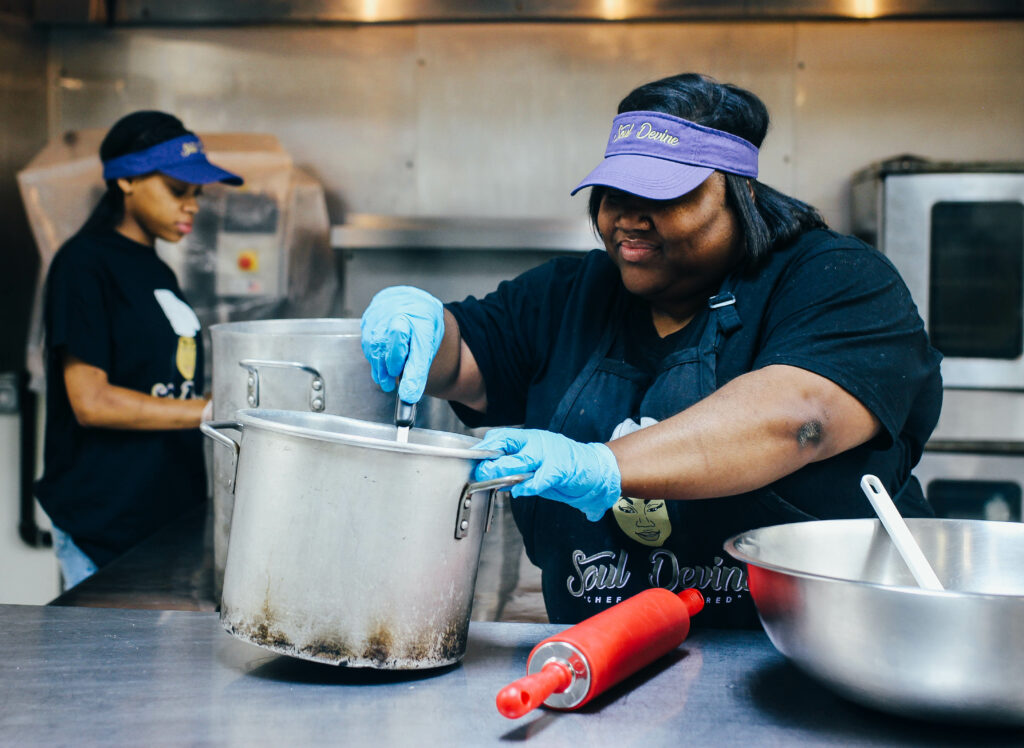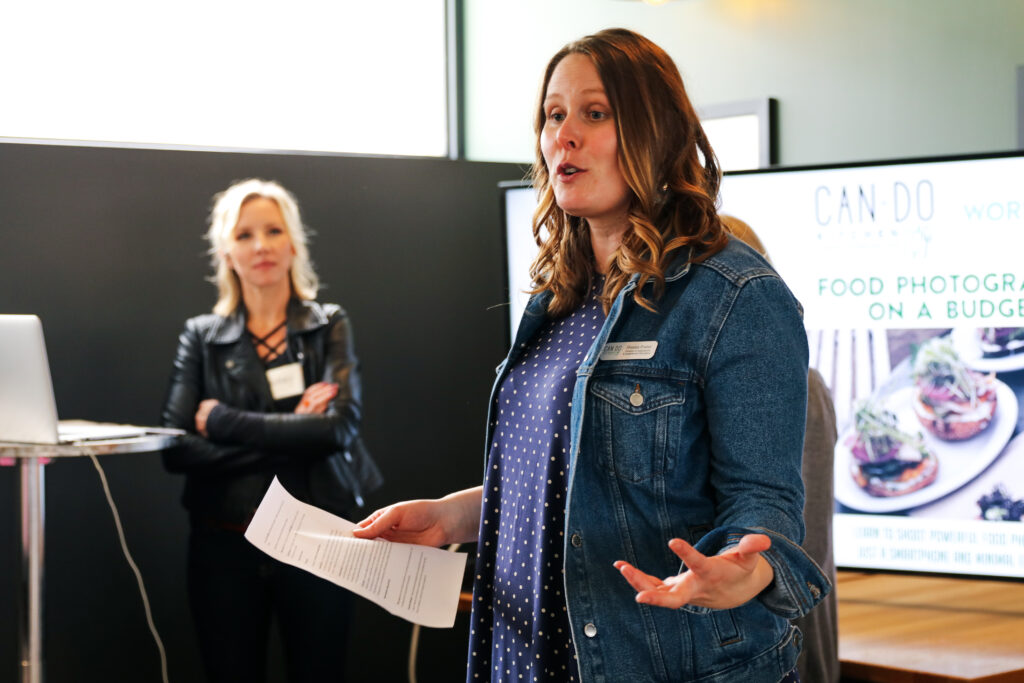Payne Chassen has the unique experience of being an entrepreneur in the business of aiding other entrepreneurs. In her small town of L’Anse, population 1,904, there is a single grocery store and less than a handful of restaurants – plus, 7 successfully operating food businesses, as well as 32 independent artists, all located in her shared-use kitchen of Cafe L’Anse. The Cafe L’Anse model is unique: while the food counter and retail space could operate on its own, the business thrives with a shared-kitchen model, with additional businesses offering anything from baked goods to freeze-dried herbs.
Not only that, but Chassen has the joy of discovering unique talents in her community. Sometimes, neighbors stop by to inquire about hourly positions, but she turns the inquiry to them by posing the question,”What do you like to do?” She then empowers them to become entrepreneurs in their own right, and, in her own words, “lets them be their fabulous selves and designs the space around their needs.”
Cafe L’Anse falls under the umbrella of a ‘shared-use kitchen’, which can include ‘incubator kitchens.’ These spaces, found throughout the state of Michigan and beyond, are focused on building small businesses by providing operating space, as well as varying resources like business development classes, networking opportunities, and in the case of Cafe L’Anse, a commercial outlet.
Why Are Incubator Kitchens Important?

For entrepreneurs, the option of starting a business in an incubator kitchen allows them to take on a lot less financial risk to start operating. “Let’s say you invest $30,000 in a kitchen, you license it for a year, get it up to code, then you sell your product and it turns out people don’t like your products, right?” speculates Parker Jones, Innovation Counselor with the Michigan State University Product Center. “So you want to test the market and learn as easily as you can.” Incubator kitchens offer an easy stepping stone to success for those newborn enterprises.
“Making the choice to turn your hobby into a business is a big step – scaling up or diversifying a food business in a way that requires the production of food in a certified kitchen is a GIANT leap,” adds Sam Stokes, Food and Farm Business Outreach Specialist for MSU Center for Regional Food Systems (CRFS.) “I cannot even fathom the number of small, local food businesses we would lose if entrepreneurs had to go straight from the start up or cottage-law production phase right into renting/owning their own certified space. The risk and expense to make that leap are simply too great for most.”
For communities, an incubator kitchen not only increases the local proliferation of small businesses but can revitalize neighborhoods. “The reuse and renovation of existing buildings that may be vacant is a common theme [when talking about the impact of incubator spaces.] Then, the waves from that begin to revitalize communities, and revitalize the spaces next to it,” adds Phil Britton of Fresh Systems, LLC, who collaborates with the Michigan Incubator Kitchen Network and the MSU CRFS team. “L’Anse is a tourist town. So now, having a good lunch and breakfast spot [like Cafe L’Anse] right downtown becomes something that benefits everyone in the tourism industry.”
Can-Do Kalamazoo: a Supportive Space for Entrepreneurs


In Southwest Michigan, Stokes says that conversations with new food businesses very often cite Can-Do Kalamazoo as their starting point. Located in a far more urban environment than Café L’Anse, Can-Do calls themselves a ‘low-risk space’, allowing many businesses to work with flexibility, free from financial burden. Businesses such as Brazilian Oven, Cafe Rica, and Papa’s Brittle all found success in this space, due to the opportunity to receive feedback from their customers and network with community collaborators who work with the entrepreneurs in this space.
Can-Do Kitchen is also addressing a need in their community for businesses ready to graduate from an incubator space. “In business, it’s never a smooth growth curve, it’s always these big jumps,” explains Britton. “But with food, that can sometimes require a significant financial jump to graduate.” For those businesses that may be ready to scale, but not entirely make the leap to their own brick-and-mortar space, Can-Do plans to help bridge the gap by building a larger space on Park Street. This new location will provide an “accelerator”space for scaling businesses to strengthen their business plan while also avoiding the ‘space crunch’ of being a midsize business in a small space.
Building A Food System with the Michigan Incubator Kitchen Network
The work of Cafe L’Anse and Can-Do Kitchen is bolstered by a program of MSU CRFS called the Michigan Incubator Kitchen Network (MIKN.) This program acts as “a convening space where the owners/operators/managers of shared use commercial kitchens (also known as incubator kitchens or food business accelerators) can share resources, trouble-shoot challenges and address shared concerns,” explains Stokes, who coordinates the Network, with facilitator, Fresh Systems LLC. MIKN also operates a searchable map of in-state incubator kitchens for those looking to start their business in this style of space.
Chassen says that her work is majorly aided by the programs at Michigan State University, including the MIKN, the Product Center, and CRFS. She believes that Cafe L’Anse would not be where it is today without the advice and strategy help provided by this anchor of the local food economy. Beyond that, Can-Do lauds the Making It In Michigan conference and trade show, which allows many of their budding entrepreneurs to connect with industry leaders and buyers.
Funding Dreams: How Incubator Kitchens Function as a Business

So, how does a business that is rooted in supporting a customer base that generally has a low cash flow, and will generally graduate from your services if you’ve done your job, succeed? “There’s a whole plethora of ways that these kitchens have been financed,” says Britton. “There’s a little bit of regular old bank investment, there’s some philanthropic investment. It’s usually a mix of sources.” He adds that programming, if a part of the kitchen space, generally requires grant funding. All this combined and you’ll see that many kitchens are operated by either nonprofit organizations or municipalities. “If you want to make a million dollars, you don’t start a shared-use kitchen,” adds Jones.
So why is it important that they exist?
“A good food system doesn’t just happen,” explains Jones. “So if we want equitable food, if we want healthy food, if we want resilient communities, we need to invest in it.” Thanks to Michigan State University programs and Michigan incubator kitchens, there are those who are.
This article was written in partnership with Michigan State University Center for Regional Food Systems. All images were provided by Can-Do Kalamazoo.
Claire Butler is the Content Strategy Specialist for Taste the Local Difference. Contact her at [email protected].
